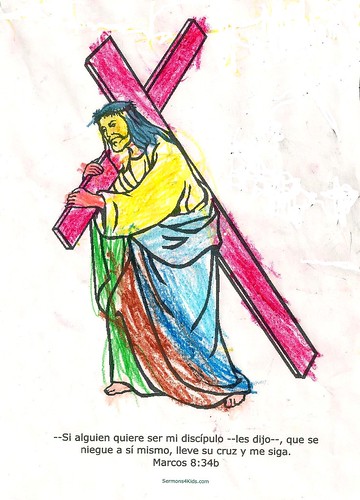 "Surely He has borne our griefs and carried our sorrows;yet we esteemed Him stricken, smitten by God, and afflicted. But He was wounded for our transgressions; He was crushed for our iniquities;upon Him was the chastisement that brought us peace, and with His stripes we are healed. All we like sheep have gone astray; we have turned - every one - to his own way; and the Lord has laid on Him the iniquity of us all." Isaiah 53:4-6
"Surely He has borne our griefs and carried our sorrows;yet we esteemed Him stricken, smitten by God, and afflicted. But He was wounded for our transgressions; He was crushed for our iniquities;upon Him was the chastisement that brought us peace, and with His stripes we are healed. All we like sheep have gone astray; we have turned - every one - to his own way; and the Lord has laid on Him the iniquity of us all." Isaiah 53:4-6In "The Varieties of Religious Experience", William James' pioneering study of the psychology of religion, there is a contrast drawn between people James called the "once-born" and the "twice-born."
The "twice-born", on the other hand, are those whom James also called "sick souls." They by instinct sense that there is something profoundly wrong with the world and with themselves, and believe that happiness in this world is fleeting, at best, and can only be achieved at great cost. The "twice-born" can only find direction by being "born again", by which James meant and "experience of deliverance" involving surrender and sacrifice. For the "twice-born", a religion of vague platitudes, moralism and outward rituals can never be sufficient; they want something that will allow them to stare evil in the face. They may handle the encounter with evil better than the "once-born," but their weakness is the tendency to despair of any final victory of light over darkness and simply accept the existence of evil in the world with stoic passivity.
This, of course, is not what the Scriptures mean by being "born again" or "from above" by the Holy Spirit. Our salvation depends not on our feelings or inclinations, but on the objective truths of God's Word. Thus, God' s Word has something to say to persons of both these temperaments. C.S. Lewis once said that the Devil encourages two equal and opposite errors about himself: One being not to believe in his existence, and the other to believe and be terrified. "Once-born" people might be described as people who are inclined to disbelieve in the Devil as well as the depth of their own sinfulness, while James' "twice-born" are those inclined to fear evil, or at least live without the joy and hope that might be theirs.
I bring up this psychological typology only as a way of perhaps explaining the importance of the Lenten season. If the secular world today takes note of Lent at all, it may be as the basis of a "romantic comedy" about a young man abstaining from sex for "40 Days and 40 Nights". But those who are comfortable with the world and their place in it need to consider the words of the prophet Isaiah and the hymn those words inspired, "Stricken, Smitten and Afflicted", English words by Thomas Kelly (1804):
"Ye who think of sin but lightly,
Nor suppose the evil great,
Here may view its nature rightly,
Here its guilt may estimate.
Mark the Sacrifice appointed!
See Who bears the awful load!
'Tis the Word, the Lord’s Anointed,
Son of Man, and Son of God."
Christ suffered the punishment the each one of us merited, in order to obtain for us redemption and a new relationship with God.We all need to hear this. The solemn reflections of Lent are not to be forgotten in joy and celebration of Easter. Lent prepares us for Easter.
Especially for those "sick souls", who are all to aware of their own sins and the suffering of the world, must remember, "upon Him was the chastisement that brought us peace, and with His stripes we are healed."
"Here we have a firm foundation,
Here the refuge of the lost.
Christ the Rock of our salvation,
Christ the Name of which we boast.
Lamb of God for sinners wounded!
Sacrifice to cancel guilt!
None shall ever be confounded
Who on Him their hope have built."

No comments:
Post a Comment